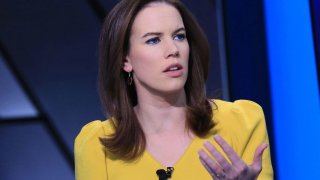
Good luck trying to figure out what's going on with the economy and the markets lately. Today's data offer a good example of that. At 8:30am we learned that jobless claims got worse last week (yikes), but the Philadelphia regional manufacturing gauge rebounded and new orders--a great leading indicator--jumped to a two-year high.
Or zoom out and look at the conflicting datapoints on the consumer. We keep seeing retail blowups--like Five Below losing 25% of its market cap yesterday--while at the same time overall U.S. retail sales have been surprising to the upside. And Max Levchin, CEO of "don't-call-us-buy-now-pay-later" provider Affirm, told us yesterday that their data, and a survey to be released next week, show the consumer is doing just fine.
I mention all this because it seems equally difficult to figure out what's going on with stocks. We've had this massive, violent rotation into small-caps over the past week. The Russell 2000 is up 9%, while the Nasdaq 100 is down 4%. That is the widest underperformance gap big tech has seen since 2000 and 2001, per Bespoke. Is it a bullish sign that market leadership is finally broadening out? Or a bearish sign that the markets are breaking down?
Albert Edwards is in the bearish camp--but then, of course, he would be. In a note this morning, the Societe Generale strategist warns clients we could be on the "brink of another Nasdaq crash" and that "investors need to be on high alert for a potential bursting of the bubble." But he acknowledges his own colleague, Manish Kabra--whom we also had on the show yesterday--is on the "benevolent broadening out" team.
Get top local stories in San Diego delivered to you every morning. Sign up for NBC San Diego's News Headlines newsletter.
"I [worry] a benign rotation could easily turn into a self-fulfilling market rout," Edwards wrote, "which back in the day triggered the March 2001 recession. Which reminds me just how fragile the economy is currently," he said, noting the drop in temporary employment we've been seeing.
But Larry Lindsey is far more bullish. "Don't bet on those rate cuts," the economist and former Bush administration official has been telling clients. The surprisingly strong May and June retail sales reports, he says, stem from the better real wage growth we've been experiencing, and should result in more employment and GDP growth going forward.
Perhaps the obvious thing to say here is that the market may be first to tell us who's right, and hence little things like the outperformance of consumer staples yesterday can take on added import. Staples had their third best day relative to the QQQs in 15 years, per Bank of America. It's one thing when industrials and cyclicals outperform; and quite another when stodgy defensive trades do.
Money Report
If nothing else, it's closing of one era--witness Leslie's pool and spa crashing 29% today, and down 90% from its 2021 pandemic highs, or Domino's Pizza sinking 11% after disappointing results--and the dawn of another (namely, AI). It isn't easy to pull off these transitions seamlessly, and that's what markets are currently attempting to do.
See you at 1 p.m!
Kelly
Click HERE to sign up for this newsletter in one easy step.
To hear this as a podcast, subscribe to "The Exchange" and pick "From the desk of..."






